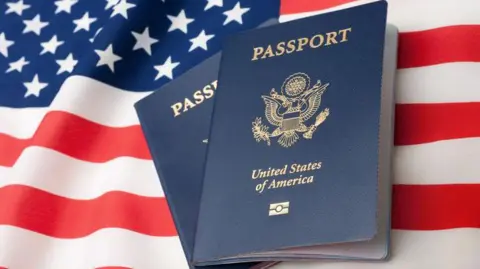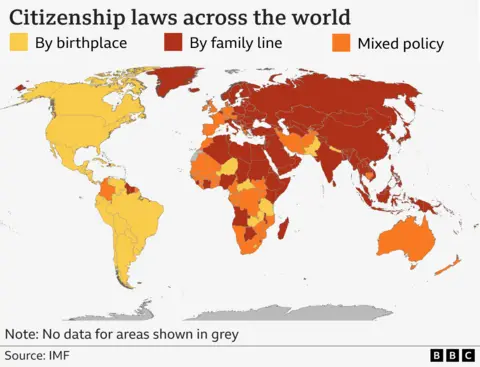BBC World Service
 Getty Photographs
Getty PhotographsPresident Donald Trump’s govt order to finish birthright citizenship within the US has sparked a number of authorized challenges and a few anxiousness amongst immigrant households.
For practically 160 years, the 14th Modification of the US Structure has established the precept that anybody born within the nation is a US citizen.
However as a part of his crackdown on migrant numbers, Trump is looking for to disclaim citizenship to youngsters of migrants who’re both within the nation illegally or on momentary visas.
The transfer seems to have public backing. A poll by Emerson College suggests many extra People again Trump than oppose him on this.
However how does this examine to citizenship legal guidelines all over the world?
Birthright citizenship worldwide
Birthright citizenship, or jus soli (proper of the soil), shouldn’t be the norm globally.
The US is certainly one of about 30 nations – largely within the Americas – that grant computerized citizenship to anybody born inside their borders.
In distinction, many nations in Asia, Europe, and components of Africa adhere to the jus sanguinis (proper of blood) precept, the place youngsters inherit their nationality from their dad and mom, no matter their birthplace.
Different nations have a mix of each rules, additionally granting citizenship to youngsters of everlasting residents.

John Skrentny, a sociology professor on the College of California, San Diego, believes that, although birthright citizenship or jus soli is widespread all through the Americas, “every nation-state had its personal distinctive street to it”.
“For instance, some concerned slaves and former slaves, some didn’t. Historical past is sophisticated,” he says. Within the US, the 14th Modification was adopted to deal with the authorized standing of freed slaves.
Nevertheless, Mr Skrentny argues that what nearly all had in widespread was “constructing a nation-state from a former colony”.
“They needed to be strategic about whom to incorporate and whom to exclude, and methods to make the nation-state governable,” he explains. “For a lot of, birthright citizenship, primarily based on being born within the territory, made for his or her state-building targets.
“For some, it inspired immigration from Europe; for others, it ensured that indigenous populations and former slaves, and their youngsters, can be included as full members, and never left stateless. It was a specific technique for a specific time, and that point could have handed.”
Shifting insurance policies and rising restrictions
In recent times, a number of nations have revised their citizenship legal guidelines, tightening or revoking birthright citizenship resulting from considerations over immigration, nationwide identification, and so-called “beginning tourism” the place individuals go to a rustic in an effort to give beginning.
India, for instance, as soon as granted computerized citizenship to anybody born on its soil. However over time, considerations over unlawful immigration, significantly from Bangladesh, led to restrictions.
Since December 2004, a baby born in India is simply a citizen if each dad and mom are Indian, or if one mum or dad is a citizen and the opposite shouldn’t be thought-about an unlawful migrant.
Many African nations, which traditionally adopted jus soli beneath colonial-era authorized programs, later deserted it after gaining independence. As we speak, most require at the very least one mum or dad to be a citizen or a everlasting resident.
Citizenship is much more restrictive in most Asian nations, the place it’s primarily decided by descent, as seen in nations akin to China, Malaysia, and Singapore.
Europe has additionally seen vital adjustments. Eire was the final nation within the area to permit unrestricted jus soli.
It abolished the coverage after a June 2004 ballot, when 79% of voters accredited a constitutional modification requiring at the very least one mum or dad to be a citizen, everlasting resident, or authorized momentary resident.
The federal government mentioned change was wanted as a result of international girls had been travelling to Eire to provide beginning in an effort to get an EU passport for his or her infants.
 Reuters
ReutersSome of the extreme adjustments occurred within the Dominican Republic, the place, in 2010, a constitutional modification redefined citizenship to exclude youngsters of undocumented migrants.
A 2013 Supreme Court docket ruling made this retroactive to 1929, stripping tens of hundreds – largely of Haitian descent – of their Dominican nationality. Rights teams warned that this might depart many stateless, as they didn’t have Haitian papers both.
The transfer was broadly condemned by worldwide humanitarian organisations and the Inter-American Court docket of Human Rights.
On account of the general public outcry, the Dominican Republic handed a legislation in 2014 that established a system to grant citizenship to Dominican-born youngsters of immigrants, significantly favouring these of Haitian descent.
Mr Skrentny sees the adjustments as a part of a broader world pattern. “We are actually in an period of mass migration and simple transportation, even throughout oceans. Now, people additionally may be strategic about citizenship. That is why we’re seeing this debate within the US now.”
Authorized challenges
 Reuters
ReutersInside hours of President Trump’s order, varied lawsuits had been launched by Democratic-run states and cities, civil rights teams and people.
Two federal judges have sided with plaintiffs, most not too long ago District Choose Deborah Boardman in Maryland on Wednesday.
She sided with 5 pregnant girls who argued that denying their youngsters citizenship violated the US Structure.
Most authorized students agree that President Trump can’t finish birthright citizenship with an govt order.
In the end this shall be determined by the courts, mentioned Saikrishna Prakash, a constitutional professional and College of Virginia Legislation Faculty professor. “This isn’t one thing he can resolve on his personal.”
The order is now on maintain because the case makes it by the courts.
It’s unclear how the Supreme Court docket, the place conservative justices kind a supermajority, would interpret the 14th Modification if it got here to it.
Trump’s justice division has argued it solely applies to everlasting residents. Diplomats, for instance, are exempt.
However others counter that different US legal guidelines apply to undocumented migrants so the 14th Modification ought to too.

